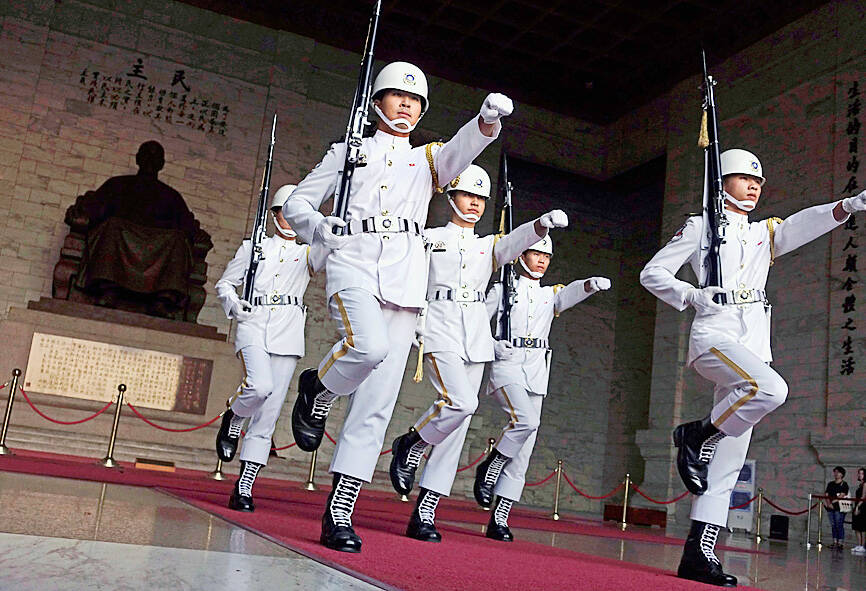Honor guards are to stop performing changing of the guard ceremonies around a statue of Chiang Kai-shek (蔣介石) to avoid “worshiping authoritarianism,” the Ministry of Culture said yesterday.
The fate of the bronze statue has long been the subject of fierce and polarizing debate in Taiwan, which has transformed from an autocracy under Chiang into one of Asia’s most vibrant democracies.
The changing of the guard each hour at the Chiang Kai-shek Memorial Hall in Taipei is a major tourist attraction, but starting from 9am on Monday, the ceremony is to be moved outdoors to Democracy Boulevard, outside the eponymous blue-and-white memorial hall.

Photo: AFP
“Eliminating the worshipping of a cult personality and the worshipping of authoritarianism is the goal of promoting transitional justice,” the ministry said in a statement.
“The military honor guards’ sentry duty at the hall would be removed ... but their performances would be maintained, with the venue moving to the Democracy Boulevard,” it added.
The Ministry of National Defense said that a six-member honor guard would continue to conduct flag ceremonies and ceremonial patrols around the hall’s perimeter.
The guards at each hour would march out from the hall’s northern and southern portals in two equal teams to walk the perimeter and then converge in a drill on Democracy Boulevard before the main gate of the structure, it said.
The ceremonial patrols would be suspended on rainy days, while the flag would be raised at 9am and lowered at 5pm, it added.
Chiang is seen by many as the embodiment of a brutal military regime that exiled, imprisoned and killed thousands of opponents until his death in 1975.
For many young Taiwanese, he is also synonymous with the kind of authoritarianism seen in China.
Hundreds of other statues of Chiang have already been moved to Chiang Kai-shek Cihu Statue Park (慈湖蔣公銅像公園), a lakeside park close to his mausoleum in Taoyuan.
Additional reporting by Wu Che-yu

Taiwan is stepping up plans to create self-sufficient supply chains for combat drones and increase foreign orders from the US to counter China’s numerical superiority, a defense official said on Saturday. Commenting on condition of anonymity, the official said the nation’s armed forces are in agreement with US Admiral Samuel Paparo’s assessment that Taiwan’s military must be prepared to turn the nation’s waters into a “hellscape” for the Chinese People’s Liberation Army (PLA). Paparo, the commander of the US Indo-Pacific Command, reiterated the concept during a Congressional hearing in Washington on Wednesday. He first coined the term in a security conference last

Prosecutors today declined to say who was questioned regarding alleged forgery on petitions to recall Democratic Progressive Party (DPP) legislators, after Chinese-language media earlier reported that members of the Chinese Nationalist Party (KMT) Youth League were brought in for questioning. The Ministry of Justice Investigation Bureau confirmed that two people had been questioned, but did not disclose any further information about the ongoing investigation. KMT Youth League members Lee Hsiao-liang (李孝亮) and Liu Szu-yin (劉思吟) — who are leading the effort to recall DPP caucus chief executive Rosalia Wu (吳思瑤) and Legislator Wu Pei-yi (吳沛憶) — both posted on Facebook saying: “I

Sung Chien-liang (宋建樑), who led efforts to recall Democratic Progressive Party (DPP) Legislator Lee Kun-cheng (李坤城), was released on bail of NT$80,000 today amid outcry over his decision to wear a Nazi armband to questioning the night before. Sung arrived at the New Taipei District Prosecutors’ Office for questioning in a recall petition forgery case last night wearing a red armband bearing a swastika, carrying a copy of Adolf Hitler’s Mein Kampf and giving a Nazi salute. Sung left the building at 1:15am without the armband and covering the book with his coat. Lee said today that this is a serious

A mountain blaze that broke out yesterday morning in Yangmingshan National Park was put out after five hours, following multi agency efforts involving dozens of fire trucks and helicopter water drops. The fire might have been sparked by an air quality sensor operated by the National Center for High-Performance Computing, one of the national-level laboratories under the National Applied Research Laboratories, Yangmingshan National Park Headquarters said. The Taipei City Fire Department said the fire, which broke out at about 11am yesterday near the mountainous Xiaoyoukeng (小油坑) Recreation Area was extinguished at 4:32pm. It had initially dispatched 72 personnel in four command vehicles, 16